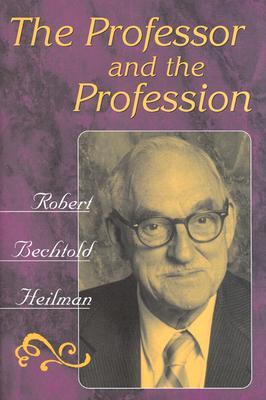Emeritus professor of English at the University of Washington in Seattle, Robert B. Heilman has been publishing for over 60 years and has done distinguished work on drama and fiction. A good book of literary terms, for instance, refers to his Tragedy and Melodrama: Versions of Experience (1968) under the word “melodrama.” When you become part of the definition of a term, I suppose that you have achieved some authority. I read Heilman’s book on Othello (Magic in the Web, 1956) 35 years ago, and have never forgotten it. I learned a lot about Shakespeare, and I also learned how far analysis could go, and how much it could reveal. Having read that book, I would always want to know what Professor Heilman has to say about virtually anything, so it is a particular pleasure to see just what he is up to this time.
In this gathering, he has a lot on his mind; but I think these pieces are united by something more than the identity of the author—they are united by the mind that has projected them. Having attained a certain age, he remembers that things used to be different. Some of his essays are about his background in Pennsylvania, and his schooling, and his experiences over the years with such passions as baseball, football, and railroads. Others offer memories of such writers as Eric Voegelin and Robert Penn Warren (whom he knew at L.S.U.), and Theodore Roethke and Malcolm Cowley (whom he knew at the University of Washington). But from Heilman we always expect the directly literary engagement and his way with definitions, and we are not disappointed in that regard, either.
Professor Heilman has a revealing way of attacking texts which I think of, perhaps wrongly, as Aristotelian. Perhaps I should see his characteristic approach as related to the practices of the old New Criticism; or maybe it is simply a quality of Heilman himself Whatever it is, I know it when I see it, and I relish the results. His treatment of The Taming of the Shrew insists that the play be read in relation to the genre of farce. Thus released from any distortion of consciousness such as has required a feminist reading for a century, Heilman clarifies our understanding of something that ought to be rather simple, or rather is transparent after his exposition. “Petruchio not only uses the word tame more than once but openly compares his method to that used in training falcons (IV.i.191ff.). There is no reason whatever to suppose that this was not meant quite literally.” Heilman’s argument, which he calls a “return of the shrew,” lets us see Shakespeare’s triumph over the limitations of farce as related to Petruchio’s achievement as a precocious artist and Kate’s growth as a woman who began as—a shrew. Even in dealing with a work of this stature, Heilman has that eye both for detail and for the force of genre that has served him so well in his other writings on Shakespeare. And I could say the same for his essays on Cymbeline and Timon of Athens. But beyond literary-historical considerations, I notice that Heilman’s treatment of texts has a broad applicability. This sense of distinctions and of the distortion of extremities leads him to suppose that we should be “fanatics against fanaticism and skeptics of skepticism.” The balanced understanding of literature is related to a balanced view of the world.
But Heilman has distinguished himself in writing about fiction as well as drama, and again he shows why. I wish that I had seen his succinct treatment of Thomas Hardy a long time ago—it would have saved me a lot of trouble. Hardy always confused me by the contradiction between his editorializing and his performance, but he can’t fool Heilman, whose cool clarity makes me feel a little bit like Holden Caulfield blurrily remembering Eustacia Vye. Examining an utterly different writer, Heilman’s treatment of Eudora Welty’s Losing Battles (one of the finest of Southern novels) is also a brilliant performance. “In brief, Losing Battles is a highly ordered book, but it does not wear its order on its sleeve.” Pursuing language and myth to their foundations, Heilman finds allusions to Sophocles and Fielding buried in Welty’s remarkable work. His account of it will no doubt survive as long as the novel does.
Heilman’s essays on education are as valuable as his pieces focused on specific works, because his analytical ability yields such revealing results. Balance is a principle of the mind, and not only of dramatic structure. Insisting that “there is no need to equate democracy with the slipshod, chaotic, and lowest common denominator,” he remembers both the education he knew and the ideal behind it as democratic in the best sense: “[I]t assumed that every man was capable of being inducted into the community of knowledge and understanding.” That Professor Heilman himself personifies the practice and the ideals of that community is evident on every page of this book of professions.
[The Professor and the Profession, by Robert Bechtold Heilman (Columbia: University of Missouri Press) 358 pp., $39.95]

Leave a Reply